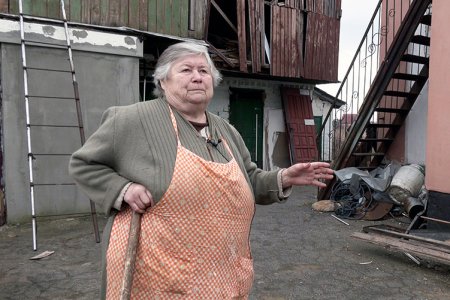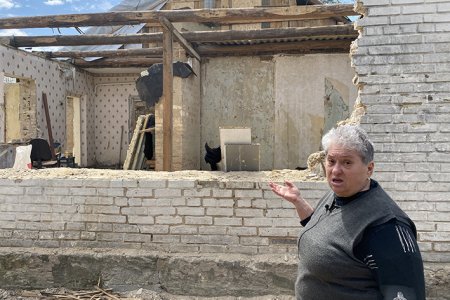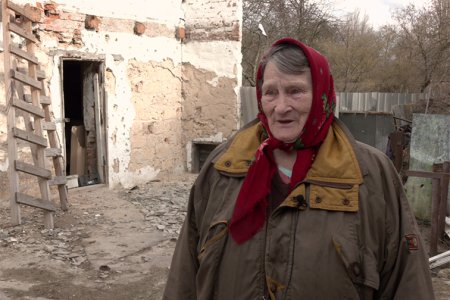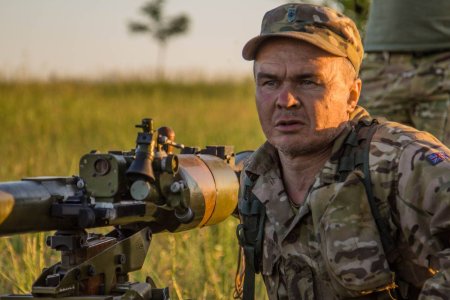How did the events in 2014 affect your life?
In 2014, as everyone knows, the conflict in Donbas began when our so-called “brothers” (Russians) came to “defend” us, so to speak. And in the beginning we believed that we would be liberated, that the Ukrainian army would come and save us. We were writing all days long to our army about the movements of the Russian troops. There were special accounts on Twitter for that. They were called “Stop Terror”. We provided information we knew, we hoped that soon there would be a Ukrainian flag over our city council. Unfortunately, this did not happen, and somewhere around the 7th of August, apparently, the whole city was cut off from electricity, and we were in an information vacuum until the 20th of August. Before the blackout we knew that Lysychansk and Sievierodonetsk (towns in Luhansk Кegion) had been liberated, that our army was moving towards the borders. And when electricity was switched on, we found out that there was already the Battle of Ilovaisk (huge battle between Ukrainian forces, pro-Russian groups and Russian troops in Ilovaisk, Donetsk Region) ... Then we understood: it was obvious that we would not be liberated in the near future.
Then, in September, there was the first “Minsk” (the Minsk agreements) and my boyfriend (now he is my husband) started persuading me to get out of Horlivka. But I had a problem that I just turned 25, and I handed in my passport for photo changing, so I was left without a document because all state agencies were closed, shootings started. I couldn’t leave through the checkpoints. As I was told later, I would probably have been passed even without my passport. But I was afraid to leave, so as not to be captured. By the way, they (Russians) arrested me in the summer, so I didn’t want to have any contacts with them anymore. We waited until I was able to find a way out with the help of acquaintances, how to get my passport. I got my passport when the school year had already started. I told my boyfriend that I would wait until the end of the school year. And then if we didn’t got fired, I would leave the town. I wanted to find a job later, because I did not want to live off my boyfriend... I was young, strong and I could work. As you can understand, no one needed a new teacher at school in the middle of the school year. So I waited until May, resigned and left for Kramatorsk on June 14, 2015. After that, I visited Horlivka only a few times to get my belongings and that was it.
How did the Russians seize your region in 2014?
The seizure took place almost bloodlessly. It was April, after Ihor Hirkin (former Federal Security Service of Russian Federation officer, organizer of militant groups in the so-called Donetsk People’s Republic) entered Sloviansk and Kramatorsk (towns in Donetsk Region). In less than a week, they came to us. They first seized the city police department, then the district departments, and then the executive committee of our town. This stage was bloodless, we saw people with machine guns all the time, if you could call them people...
I had a neighbour who worked in a drug clinik, it was May. I mentioned that she had started to pick her daughter up from school, and her daughter was about 12 years old at the time, and the school was five minutes from their house. I said, “I guess your daughter must have done something bad that you started to control her like that?” And she answered, “No, I just saw who’s standing there with machine guns at the checkpoints”. I asked, “Who’s standing there? Someone you know?” She answered: “Yes, all my patients from the drug clinic are standing there”.
The second phase started on the 27th of July, they (Russians) started bombing us. Our army tried to liberate Horlivka and that was the first hard phase. More than a dozen people were killed on the first day, just on the first day. Well then, of course, those who could leave, left the town. Those who could, just hid. We were bombed really hard back then. It was very bad. It was summer, electricity in the whole town was off, they (Russians) hit an electrical substation somewhere and there was no electricity or water because the pumps didn’t work. And worst of all, there was an information vacuum. There were so much rumours: that Ukrainian army had won the war, that the Russians had won, etc. There was almost no food in the town, there was no bread. Only in the places where generators were working in the shops you could stand in very long queues and find something. This was the phase before the first “Minsk”.
After that we had some doubts whether to stay or not. The second phase happened before the second “Minsk”, when Vuhlehirsk and Debaltseve (towns in Donetsk Region) were seized. We saw how they (Russians) were treating their military. Because it was already, in particular, the regular army and contract servicemen of different kinds, and those Buryats (mongolic ethnic group native to southeastern Siberia). There was a video, by the way, where they drove an APC (armoured personnel carrier) or a tank and shouted “Our regards to Ulan-Ude!” (capital city of Buryatia, Russia). They drove down a street that was parallel to mine, in my town. When it was the most difficult phase of the shootings, no one left houses. The shelling could go on for 18 hours a day, everyone sat still. Then step by step shootings started to end in our town, and when Vuhlehirsk and Debaltseve were seized, we started to come back to work. There were no children in the school yet, but we worked. Our windows at the school were broken, so we went to clean the school territory. Once in the morning, when we drove to work (it was winter), there was a convoy of vehicles. Police vehicles drove first, then a convoy of tanks drove, then — heavier vehicles, “Ural” trucks with enemy troops, and then — various howitzers, MLRSs (multiple launch rocket systems). And when we were on our way back from work, before sunset — that convoy was driving back. Police officers were also driving first but a few ambulances then were driving after them. There were very few of them, just 3-4 ambulances, I don’t know why, maybe each ambulance had not just one person but a few people in it... A refrigerator truck drove after ambulances. It drove every time since then. I don’t know how many bodies were in it but every time there was a refrigerator driving. Obviously that regrigerators weren’t carrying food, so... We were hoping that maybe our people would defeat them (Russians) and we would be liberated, but after that there was a second “Minsk”. We didn’t even believe that it would happen because they were negotiating for a very long time. Finally, at the second “Minsk” they agreed a ceasefire. Then we came to a final decision to leave the town because it was clear that we would never see the liberation of our town.
How unexpected were the events of February 24 for you?
Well, of course, before February 24, many people were saying that there would be war, but to be honest I didn’t believe in a full-scale invasion. I wrote on all the social networks that it could not happen, that the old man (Putin) from the neighbouring country was not completely insane. But as it turned out — he was. I couldn’t believe it, I reassured everyone, I said: “Don’t panic! There will probably be an escalation, as always. Of course, their “Smerch” (multiple rocket launchers) can reach us, maybe they will hit us with “Smerch”.... Maybe they will hit the airfield”... Because a firing range of “Smerch” was about 120 km, and from us to the nearest so-called “DPR” (Donetsk People´s Republic) point — about 80 km. On February 24, we woke up from explosions, of course our town was hit and I thought it was hit by “Smerch”. My work (our school) was near the airfield, and my friend, who was from Kramatorsk, lived not far from it, even closer to the airfield. I rushed first to see if it had hit him. I opened my Twitter account and saw: there were explosions in Brovary (town in Kyiv Region), Kyiv, Ivano-Frankivsk, etc. Then I realized that “Smerch” could not reach that cities. It was clear that there was shelling across the border and at least with some ballistic missiles or cruise missiles. To be honest, I still thought we were being hit by “Smerch” until my husband went to work. He had to go to work earlier than me. I hesitated whether to go to work or to take my child to the kindergarten, no one told me anything. We wrote to our working chats — the boss said: “Go to work”. I asked: “But what about my child? I will be in one district, and the child is in another. Or should I take the child with me? Won’t he interfere with my lessons?” While I was figuring that out, my husband went to work, he walked across the bridge, called me and said, “Something is flying here”. I answered, “Something? What exactly?” He said, “There’s a plane coming!” I asked, “What plane? How can there be a plane here? They (Russians) hit our airport, so our planes can’t take off, or if you are talking about the enemy´s planes, well anyway they can’t be that fast”. He replied, “No, it is not a plane, something else is flying. Something long, white, with wings, but not a plane”. Later, we found out on the Internet that it was “Kalibr” (Russian cruise missile). Then we heard the second air strike. There was also a third strike of some kind, I don’t know what they were trying to hit. Apparently they were trying to destroy the air defence system. But they did not succeed. That air defence system is still working there.
So this is how the war began for us. Then we packed an emergency bag, it wasn’t new to me. We gathered food and water. I went to clean our basement. The basement did not look as a bomb shelter, of course, but it would protect me from some shards of glass. To be honest, I didn’t believe until the last minute that it would be like this, that I would leave again. I said I would leave only when there would be a threat of occupation because it was harder to escape with a child than it had been for me to leave on my own back then in 2014.
How did you survive under shelling?
Speaking about daily routines, it became very difficult to survive because many shops did not work and you could not pay with card at all. Cash withdrawals were kind of a multi-day quest. We got our first cash on probably the eighth day, standing in queues every day... Buses stopped driving since the middle of the first day (of the war) because the city administration said that fuel supplies would be needed if children had to be evacuated. Since 2014 all humanitarian supplies for Kramatorsk came from Kharkiv. There was very heavy shooting in Kharkiv since the first day of the war, as you know, and it was clear that the logistics had gone wrong.
Have you witnessed the destruction of civilian facilities and buildings?
We saw with our own eyes the missiles that were shot down by our air defence system. They fell close to us, very close, even the window glass cracked. Our troops did a good job, but just for your understanding — the missiles were flying over private houses where there were no military facilities. When a missile is shot down very high in the sky, it looks like fireworks, and you can feel the vibration, but the window glasses don’t fly out. When a missile is shot down low or when it lands, then this blast wave damages houses, some people die and facades are cut off, and it happens when out troops shoot a missile down. You can´t even imagine the scale of damage when a missile is not shot down. Missiles were falling above our heads, where there were no military units, no military facilities, nothing. Of course, they (Russian troops) were aiming somewhere. There were factories but the factories were not the parts of military infrastructure either. So they were just destroying civilian infrastructure.
We saw many strikes in Horlivka as well (in 2014). Horlivka was occupied then. They (Russian troops) said then: “The Ukrainian army is shooting at you”. But both to the west of us and to the south of us was the so-called “DPR”. We were in the rear, not on the edge where the Ukrainian army was, and mortars kept shooting at us. A firing range of a mortar is five, well, eight kilometres at the most. If we looked at the map, no Ukrainian mortar could reach the place where we lived. This was said by men who served in the army, by some of our neighbours: “How can we be hit by mortars if the Ukrainian army is in the middle of nowhere?” We have seen a lot.
We saw how they (Russian troops) were shooting, how they put a mortar “Vasilek” under our windows. It is a small mortar, it fires with cluster munitions. And I want to mention again: it was impossible to hit any Ukrainian position with a mortar. They were firing in winter in 2014-2015. Friends saw “Grad” (multiple rocket launcher) drove into the field, shoot at Toretsk (Donetsk region), where the Ukrainian army was, then turned that “Grad” around and shot then back at Horlivka: the enemy wanted people in Horlivka to think that it was Ukrainian army shot back at them.
Are you aware of any civilian casualties in your town?
My colleague has an elderly mother staying there (in Kramatorsk). My colleague asked her to leave the town but you know how old people say: “I’m going to die here, in my hometown. I want to stay here. I won’t survive the road”. So she stayed. This old woman still had a son, so he used to come and bring her food. And apparently a week or a week and a half ago there was a rocket hit — a kindergarten and a school were, as Russians say, “denazified”. And the house where the woman lived was hit as well. A wall had fallen on her, it was a five-story panel building. It was good that the neighbours dug her up quickly because she would have suffocated there, as there was no way an elderly woman could have dug herself up. Fortunately, she is alive, but her whole body is bruised and it is hard for her to breathe and there are almost no doctors left. Well, thank God, she’s more or less recovering. Another woman lived near SSU (the Security Service of Ukraine) building. This was the centre of the town and there was a bunch of residential houses next to it where people were still living. Evacuation had not yet been declared, there were still a lot of people in the town and they were also very badly affected... She had a head injury and was in hospital. She didn’t even recognise her son at first. But fortunately the doctors treated her and she is now recovering as well. They left soon, and doctors in another town were helping her then. We know several people with whom I communicated via Internet and who unfortunately did not survive the war. There was a woman who lived in Kyiv region with whom we communicated and met in 2014. She was an internally displaced person, I was an internally displaced person as well, so we supported each other — in the very beginning, when we were under occupation and later, when we left our towns. She and her mother stayed in Kyiv region, and her last “tweet” we saw was in mid-March. Then we did not communicate because of bad Internet and mobile connection, and when the region was liberated in April 2022, our acquaintances wrote that, unfortunately, the woman and her mother had been hit by artillery and had not survived.
Does your son suffer from mental trauma because of the war?
The good thing is that he still doesn’t understand much about life and death. He does not understand what it is like to die forever, so he is not afraid. He knows that you can die from a rocket hit but he doesn’t understand that dying is scary. I am lucky in that respect because three years is not an adult age, so he is not afraid of it so much. He knows all about the conflict, he knows that Putin attacked Ukraine. The first days of the conflict he called him “Kaputin” (here — the combination of words “kaputt” and “Putin”). He knows that there are bad missiles, those are the ones that fly at us, and there are good missiles — the air defence system that shoot the bad ones down. He knows that his Dad went to defend Ukraine and son offers a good solution to the conflict. I don’t know where he got that... Apparently, he saw some video clip on the Internet. Son says that if Putin is sitting in a bunker, we should bury him there — then there will be no war. Fortunately, he does not have any serious psychological trauma. Watching the air defence system worked he used to say: “Mum, it’s fireworks!” We didn’t disturb much his illusions about it being fireworks. When hiding, we were sitting in the corridor because it was very cold to sit in the basement — such a cold spring was this year. He took it more as a game, thankfully. Even when there was no air-raid alarm for a long time, he would say: “Where is the alarm? When will Mummy and Daddy come to hide with me?” But, of course, the move out was not easy, and it is, after all, not our home. At first son thought it wasn’t for long but now he realises we’ve been here for a long time. He keeps asking: “When will we go home? When will we go back to Kramatorsk?” I don’t even know what to answer because there is a counter-offensive on all fronts and there is a counter-offensive in the direction of our region too. Though it goes slow but at least it goes. So I answer him: “I think only Putin knows when we will be able to come back”.
In your opinion, how can we coexist with the Russians after the war?
How can we coexist with them? I think we need either a moat with crocodiles or a fence under electric voltage... We had already changed our place of residence in 2014 and I thought then that 80 kilometres from the front line would be enough. We thought it would not affect us a second time if there was an escalation. As it turned out, this was not enough. Again we are internally displaced persons. This time it is easier because the government helps us better. Yes, it is easier this time, but changing place of residence all the time — once you have settled in one place and then move to a new one — of course, I wouldn’t want that. The border must be made in such a way that they cannot get through even if they really want to. Or we should demilitarise Russia, as they themselves say, so that they have nothing to interfere us with, as had been done once with Germany and those countries that behaved inadequately towards their neighbours.
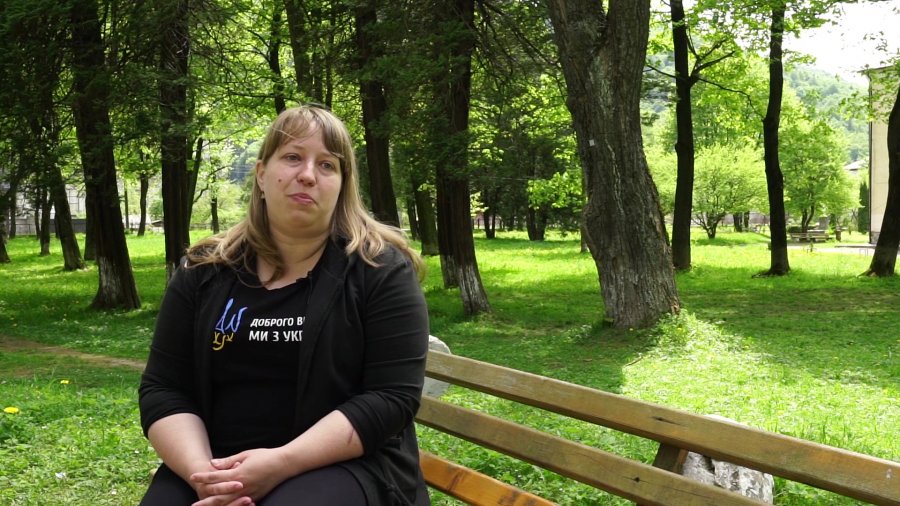
Translation: International Society for Human Rights (German Section)
 The article was prepared by the Kharkiv Human Rights Protection Group with the support of the "
The article was prepared by the Kharkiv Human Rights Protection Group with the support of the "